Chengpeng Li
Chronos: Learning Temporal Dynamics of Reasoning Chains for Test-Time Scaling
Feb 01, 2026Abstract:Test-Time Scaling (TTS) has emerged as an effective paradigm for improving the reasoning performance of large language models (LLMs). However, existing methods -- most notably majority voting and heuristic token-level scoring -- treat reasoning traces or tokens equally, thereby being susceptible to substantial variations in trajectory quality and localized logical failures. In this work, we introduce \textbf{Chronos}, a lightweight and plug-and-play chronological reasoning scorer that models each trajectory as a time series. Specifically, Chronos learns to capture trajectory features of token probabilities, assigns quality scores accordingly, and employs a weighted voting mechanism. Extensive evaluations on both in-domain and out-of-domain benchmarks demonstrate that Chronos consistently delivers substantial gains across a variety of models, with negligible computational overhead. Notably, Chronos@128 achieves relative improvements of 34.21\% over Pass@1 and 22.70\% over Maj@128 on HMMT25 using Qwen3-4B-Thinking-2507, highlighting its effectiveness.
FlakyGuard: Automatically Fixing Flaky Tests at Industry Scale
Nov 18, 2025Abstract:Flaky tests that non-deterministically pass or fail waste developer time and slow release cycles. While large language models (LLMs) show promise for automatically repairing flaky tests, existing approaches like FlakyDoctor fail in industrial settings due to the context problem: providing either too little context (missing critical production code) or too much context (overwhelming the LLM with irrelevant information). We present FlakyGuard, which addresses this problem by treating code as a graph structure and using selective graph exploration to find only the most relevant context. Evaluation on real-world flaky tests from industrial repositories shows that FlakyGuard repairs 47.6 % of reproducible flaky tests with 51.8 % of the fixes accepted by developers. Besides it outperforms state-of-the-art approaches by at least 22 % in repair success rate. Developer surveys confirm that 100 % find FlakyGuard's root cause explanations useful.
CoRT: Code-integrated Reasoning within Thinking
Jun 12, 2025Abstract:Large Reasoning Models (LRMs) like o1 and DeepSeek-R1 have shown remarkable progress in natural language reasoning with long chain-of-thought (CoT), yet they remain inefficient or inaccurate when handling complex mathematical operations. Addressing these limitations through computational tools (e.g., computation libraries and symbolic solvers) is promising, but it introduces a technical challenge: Code Interpreter (CI) brings external knowledge beyond the model's internal text representations, thus the direct combination is not efficient. This paper introduces CoRT, a post-training framework for teaching LRMs to leverage CI effectively and efficiently. As a first step, we address the data scarcity issue by synthesizing code-integrated reasoning data through Hint-Engineering, which strategically inserts different hints at appropriate positions to optimize LRM-CI interaction. We manually create 30 high-quality samples, upon which we post-train models ranging from 1.5B to 32B parameters, with supervised fine-tuning, rejection fine-tuning and reinforcement learning. Our experimental results demonstrate that Hint-Engineering models achieve 4\% and 8\% absolute improvements on DeepSeek-R1-Distill-Qwen-32B and DeepSeek-R1-Distill-Qwen-1.5B respectively, across five challenging mathematical reasoning datasets. Furthermore, Hint-Engineering models use about 30\% fewer tokens for the 32B model and 50\% fewer tokens for the 1.5B model compared with the natural language models. The models and code are available at https://github.com/ChengpengLi1003/CoRT.
START: Self-taught Reasoner with Tools
Mar 07, 2025Abstract:Large reasoning models (LRMs) like OpenAI-o1 and DeepSeek-R1 have demonstrated remarkable capabilities in complex reasoning tasks through the utilization of long Chain-of-thought (CoT). However, these models often suffer from hallucinations and inefficiencies due to their reliance solely on internal reasoning processes. In this paper, we introduce START (Self-Taught Reasoner with Tools), a novel tool-integrated long CoT reasoning LLM that significantly enhances reasoning capabilities by leveraging external tools. Through code execution, START is capable of performing complex computations, self-checking, exploring diverse methods, and self-debugging, thereby addressing the limitations of LRMs. The core innovation of START lies in its self-learning framework, which comprises two key techniques: 1) Hint-infer: We demonstrate that inserting artificially designed hints (e.g., ``Wait, maybe using Python here is a good idea.'') during the inference process of a LRM effectively stimulates its ability to utilize external tools without the need for any demonstration data. Hint-infer can also serve as a simple and effective sequential test-time scaling method; 2) Hint Rejection Sampling Fine-Tuning (Hint-RFT): Hint-RFT combines Hint-infer and RFT by scoring, filtering, and modifying the reasoning trajectories with tool invocation generated by a LRM via Hint-infer, followed by fine-tuning the LRM. Through this framework, we have fine-tuned the QwQ-32B model to achieve START. On PhD-level science QA (GPQA), competition-level math benchmarks (AMC23, AIME24, AIME25), and the competition-level code benchmark (LiveCodeBench), START achieves accuracy rates of 63.6%, 95.0%, 66.7%, 47.1%, and 47.3%, respectively. It significantly outperforms the base QwQ-32B and achieves performance comparable to the state-of-the-art open-weight model R1-Distill-Qwen-32B and the proprietary model o1-Preview.
Qwen2.5-Math Technical Report: Toward Mathematical Expert Model via Self-Improvement
Sep 18, 2024Abstract:In this report, we present a series of math-specific large language models: Qwen2.5-Math and Qwen2.5-Math-Instruct-1.5B/7B/72B. The core innovation of the Qwen2.5 series lies in integrating the philosophy of self-improvement throughout the entire pipeline, from pre-training and post-training to inference: (1) During the pre-training phase, Qwen2-Math-Instruct is utilized to generate large-scale, high-quality mathematical data. (2) In the post-training phase, we develop a reward model (RM) by conducting massive sampling from Qwen2-Math-Instruct. This RM is then applied to the iterative evolution of data in supervised fine-tuning (SFT). With a stronger SFT model, it's possible to iteratively train and update the RM, which in turn guides the next round of SFT data iteration. On the final SFT model, we employ the ultimate RM for reinforcement learning, resulting in the Qwen2.5-Math-Instruct. (3) Furthermore, during the inference stage, the RM is used to guide sampling, optimizing the model's performance. Qwen2.5-Math-Instruct supports both Chinese and English, and possess advanced mathematical reasoning capabilities, including Chain-of-Thought (CoT) and Tool-Integrated Reasoning (TIR). We evaluate our models on 10 mathematics datasets in both English and Chinese, such as GSM8K, MATH, GaoKao, AMC23, and AIME24, covering a range of difficulties from grade school level to math competition problems.
Qwen2 Technical Report
Jul 16, 2024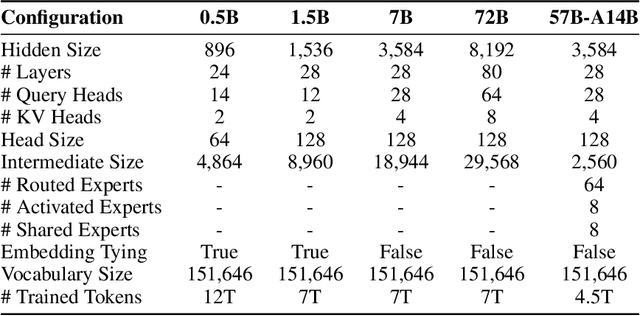
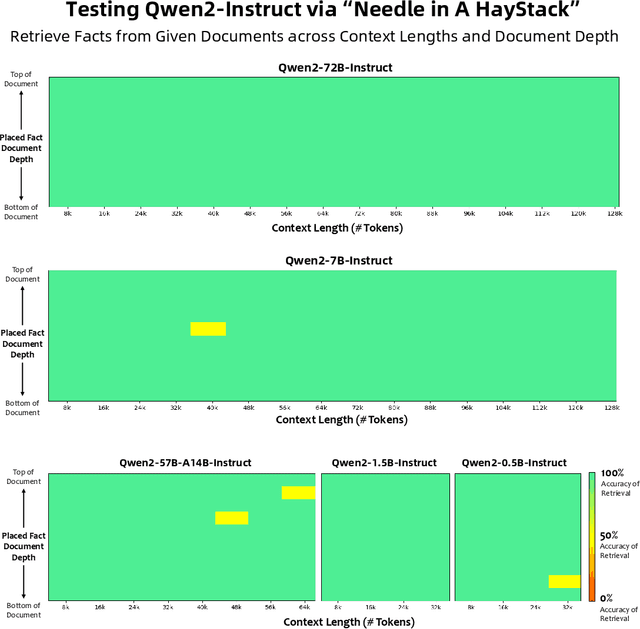
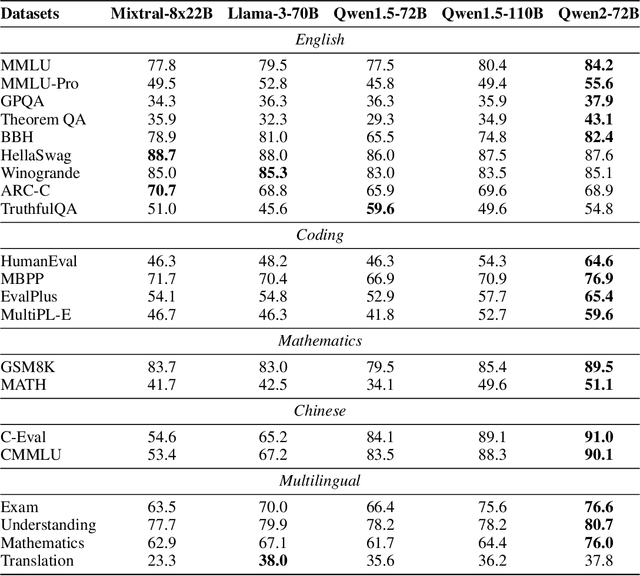
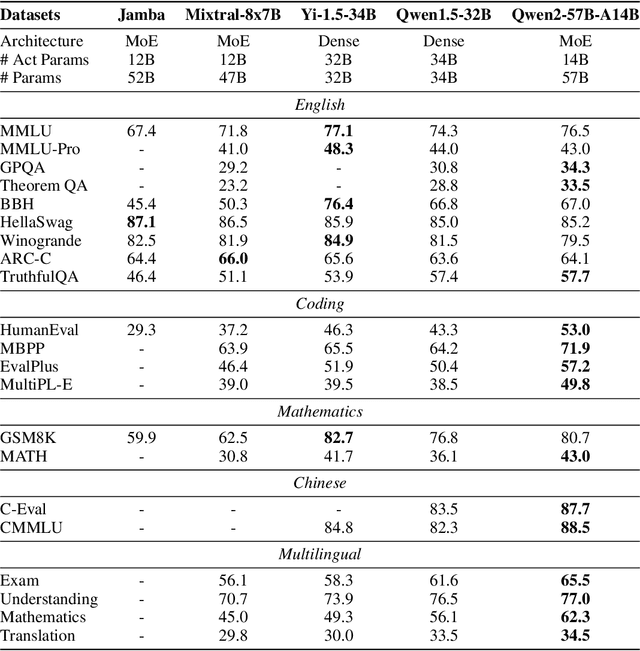
Abstract:This report introduces the Qwen2 series, the latest addition to our large language models and large multimodal models. We release a comprehensive suite of foundational and instruction-tuned language models, encompassing a parameter range from 0.5 to 72 billion, featuring dense models and a Mixture-of-Experts model. Qwen2 surpasses most prior open-weight models, including its predecessor Qwen1.5, and exhibits competitive performance relative to proprietary models across diverse benchmarks on language understanding, generation, multilingual proficiency, coding, mathematics, and reasoning. The flagship model, Qwen2-72B, showcases remarkable performance: 84.2 on MMLU, 37.9 on GPQA, 64.6 on HumanEval, 89.5 on GSM8K, and 82.4 on BBH as a base language model. The instruction-tuned variant, Qwen2-72B-Instruct, attains 9.1 on MT-Bench, 48.1 on Arena-Hard, and 35.7 on LiveCodeBench. Moreover, Qwen2 demonstrates robust multilingual capabilities, proficient in approximately 30 languages, spanning English, Chinese, Spanish, French, German, Arabic, Russian, Korean, Japanese, Thai, Vietnamese, and more, underscoring its versatility and global reach. To foster community innovation and accessibility, we have made the Qwen2 model weights openly available on Hugging Face and ModelScope, and the supplementary materials including example code on GitHub. These platforms also include resources for quantization, fine-tuning, and deployment, facilitating a wide range of applications and research endeavors.
DotaMath: Decomposition of Thought with Code Assistance and Self-correction for Mathematical Reasoning
Jul 04, 2024Abstract:Large language models (LLMs) have made impressive progress in handling simple math problems, yet they still struggle with more challenging and complex mathematical tasks. In this paper, we introduce a series of LLMs that employs the Decomposition of thought with code assistance and self-correction for mathematical reasoning, dubbed as DotaMath. DotaMath models tackle complex mathematical tasks by decomposing them into simpler logical subtasks, leveraging code to solve these subtasks, obtaining fine-grained feedback from the code interpreter, and engaging in self-reflection and correction. By annotating diverse interactive tool-use trajectories and employing query evolution on GSM8K and MATH datasets, we generate an instruction fine-tuning dataset called DotaMathQA with 574K query-response pairs. We train a series of base LLMs using imitation learning on DotaMathQA, resulting in DotaMath models that achieve remarkable performance compared to open-source LLMs across various in-domain and out-of-domain benchmarks. Notably, DotaMath-deepseek-7B showcases an outstanding performance of 64.8% on the competitive MATH dataset and 86.7% on GSM8K. Besides, DotaMath-deepseek-7B maintains strong competitiveness on a series of in-domain and out-of-domain benchmarks (Avg. 80.1%). Looking forward, we anticipate that the DotaMath paradigm will open new pathways for addressing intricate mathematical problems. Our code is publicly available at https://github.com/ChengpengLi1003/DotaMath.
Self-play with Execution Feedback: Improving Instruction-following Capabilities of Large Language Models
Jun 19, 2024



Abstract:One core capability of large language models (LLMs) is to follow natural language instructions. However, the issue of automatically constructing high-quality training data to enhance the complex instruction-following abilities of LLMs without manual annotation remains unresolved. In this paper, we introduce AutoIF, the first scalable and reliable method for automatically generating instruction-following training data. AutoIF transforms the validation of instruction-following data quality into code verification, requiring LLMs to generate instructions, the corresponding code to check the correctness of the instruction responses, and unit test samples to verify the code's correctness. Then, execution feedback-based rejection sampling can generate data for Supervised Fine-Tuning (SFT) and Reinforcement Learning from Human Feedback (RLHF) training. AutoIF achieves significant improvements across three training algorithms, SFT, Offline DPO, and Online DPO, when applied to the top open-source LLMs, Qwen2 and LLaMA3, in self-alignment and strong-to-weak distillation settings. Our code is publicly available at https://github.com/QwenLM/AutoIF.
Model-enhanced Contrastive Reinforcement Learning for Sequential Recommendation
Oct 25, 2023
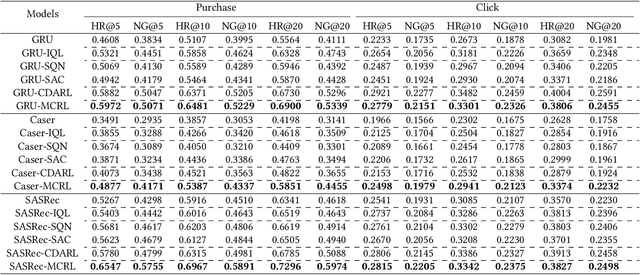
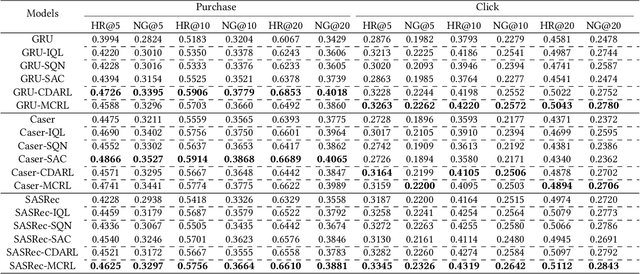

Abstract:Reinforcement learning (RL) has been widely applied in recommendation systems due to its potential in optimizing the long-term engagement of users. From the perspective of RL, recommendation can be formulated as a Markov decision process (MDP), where recommendation system (agent) can interact with users (environment) and acquire feedback (reward signals).However, it is impractical to conduct online interactions with the concern on user experience and implementation complexity, and we can only train RL recommenders with offline datasets containing limited reward signals and state transitions. Therefore, the data sparsity issue of reward signals and state transitions is very severe, while it has long been overlooked by existing RL recommenders.Worse still, RL methods learn through the trial-and-error mode, but negative feedback cannot be obtained in implicit feedback recommendation tasks, which aggravates the overestimation problem of offline RL recommender. To address these challenges, we propose a novel RL recommender named model-enhanced contrastive reinforcement learning (MCRL). On the one hand, we learn a value function to estimate the long-term engagement of users, together with a conservative value learning mechanism to alleviate the overestimation problem.On the other hand, we construct some positive and negative state-action pairs to model the reward function and state transition function with contrastive learning to exploit the internal structure information of MDP. Experiments demonstrate that the proposed method significantly outperforms existing offline RL and self-supervised RL methods with different representative backbone networks on two real-world datasets.
Query and Response Augmentation Cannot Help Out-of-domain Math Reasoning Generalization
Oct 09, 2023
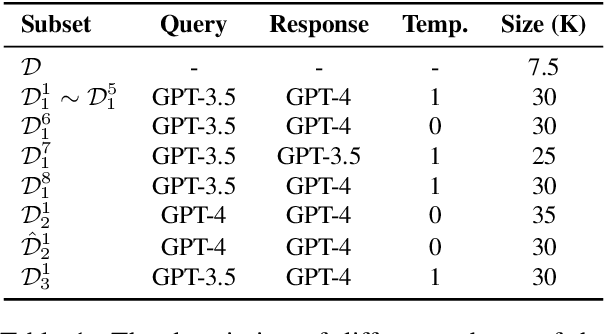
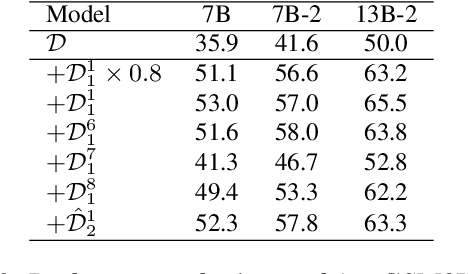
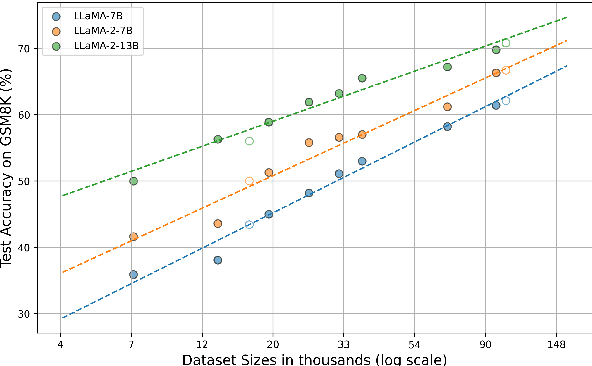
Abstract:In math reasoning with large language models (LLMs), fine-tuning data augmentation by query evolution and diverse reasoning paths is empirically verified effective, profoundly narrowing the gap between open-sourced LLMs and cutting-edge proprietary LLMs. In this paper, we conduct an investigation for such data augmentation in math reasoning and are intended to answer: (1) What strategies of data augmentation are more effective; (2) What is the scaling relationship between the amount of augmented data and model performance; and (3) Can data augmentation incentivize generalization to out-of-domain mathematical reasoning tasks? To this end, we create a new dataset, AugGSM8K, by complicating and diversifying the queries from GSM8K and sampling multiple reasoning paths. We obtained a series of LLMs called MuggleMath by fine-tuning on subsets of AugGSM8K. MuggleMath substantially achieves new state-of-the-art on GSM8K (from 54% to 68.4% at the scale of 7B, and from 63.9% to 74.0% at the scale of 13B). A log-linear relationship is presented between MuggleMath's performance and the amount of augmented data. We also find that MuggleMath is weak in out-of-domain math reasoning generalization to MATH. This is attributed to the differences in query distribution between AugGSM8K and MATH which suggest that augmentation on a single benchmark could not help with overall math reasoning performance. Codes and AugGSM8K will be uploaded to https://github.com/OFA-Sys/gsm8k-ScRel.
 Add to Chrome
Add to Chrome Add to Firefox
Add to Firefox Add to Edge
Add to Edge